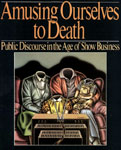 Amusing Ourselves to Death
Amusing Ourselves to Death
Public Discourse in the Age of Show Business
Neil Postman
This important book helps explain the current state of our society, media, and education. Postman begins by contrasting the two great futurist novels, 1984 and Brave New World. He concludes that Huxley made the better prediction—no need for a police state when we have television!
 His basic premise is that we have moved beyond the age of information-rich typography into a new world dominated by images and sound bites. The unit of discourse is the thirty second television commercial, which attempts to make an emotional connection with viewers rather than inform them. The result is a dumbing down of everything from the evening news to PowerPoint dominated classrooms. The one thing he clearly gets wrong is the importance of computers, very forgivable when you consider that computers were mostly used for text and numbers back then. See also these longer reviews (2)(3). Unfortunately Postman died in 2003, but his legacy lives on!
His basic premise is that we have moved beyond the age of information-rich typography into a new world dominated by images and sound bites. The unit of discourse is the thirty second television commercial, which attempts to make an emotional connection with viewers rather than inform them. The result is a dumbing down of everything from the evening news to PowerPoint dominated classrooms. The one thing he clearly gets wrong is the importance of computers, very forgivable when you consider that computers were mostly used for text and numbers back then. See also these longer reviews (2)(3). Unfortunately Postman died in 2003, but his legacy lives on!

 Just back from attending this
Just back from attending this 